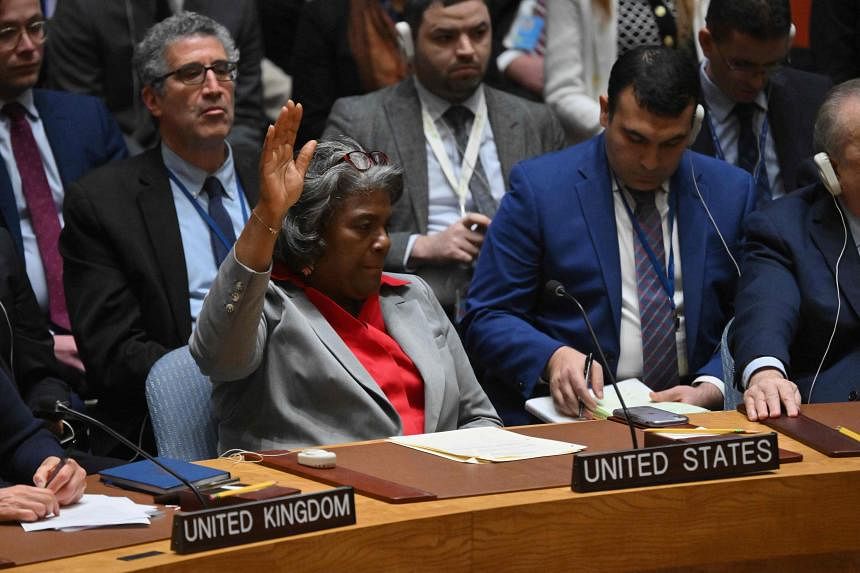MORGANTOWN (West Virginia) – The dramatic shift in Washington’s stance on Israel is directed against Prime Minister Benjamin Netanyahu, whom the United States has come to view as an intractable ally.
The new Israel policy is equally aimed at boosting US President Joe Biden’s prospects in the Nov 5 presidential election. The massive and well-coordinated pro-Palestinian protests across the country, including in Washington, have demonstrated the power of liberals as well as Arab-American voters.
Rather than shield Israel with a veto, the US on March 25 abstained from voting on a United Nations resolution demanding an immediate ceasefire in the Palestinian enclave of Gaza between Israeli troops and Hamas militants, without tying it to the release of hostages.
The 15-member Security Council passed the resolution 14-0.
The US had vetoed past ceasefire resolutions because they were not directly tied to the release of hostages and had failed to condemn Hamas’ attacks.
This time, the country is still alone in linking a ceasefire to the release of hostages. China, Russia and other council members favour unconditional calls for a ceasefire after Israel’s offensive in Gaza, which has killed over 32,000 Palestinians. It has also triggered a humanitarian crisis, leaving a third of Gaza’s population on the verge of starvation.
The offensive was in retaliation for Hamas’ Oct 7 attack on southern Israel, which killed some 1,200 people. The militants also took around 250 hostages, and are still holding about 100 people captive.
Explaining the US decision, White House national security spokesman John Kirby said the US chose to abstain from the vote because the proposal “does fairly reflect our view that a ceasefire and the release of hostages come together”.
US Ambassador to the UN Linda Thomas-Greenfield said Washington did not support the resolution because “certain edits” the US had requested were ignored, including a condemnation of Hamas.
US-based analysts told The Straits Times that the abstention is not a parting of ways between the US and Israel, but a clear expression of the US’ growing disquiet over Mr Netanyahu’s war that has caused a high number of civilian casualties and obstructed the flow of humanitarian aid into Gaza.
“The US abstention represents another step away from the very strong support the Biden administration showed towards Israel in the first month or two of the war,” said Mr Elliott Abrams, senior fellow of Middle Eastern studies at the Council on Foreign Relations in Washington.
“The text did not clearly make a ceasefire dependent on a simultaneous release of hostages and therefore should have been vetoed,” he added, stressing that it was his personal opinion rather than the think-tank’s position.
The analysts, while at pains to suggest that it was not a departure from US policy towards Israel, saw the move as calibration.
“It is not a big policy change, but it is part of a slide in Biden policy,” said Mr Abrams, who served as deputy assistant to the president and deputy national security adviser in the George W. Bush administration, where he supervised White House policy in the Middle East.
Professor Benjamin Radd, a lecturer in law and global studies at the University of California, Los Angeles (UCLA) School of Law, said the turn of events was not too surprising, given the growing gap between Mr Biden and Mr Netanyahu.
Mr Biden has said Israeli military reaction to the Hamas massacre of Oct 7 has been “over the top”. Senate Majority Leader Chuck Schumer, the highest-ranking Jewish official in the US, has also openly discredited Mr Netanyahu, saying he was not operating in Israel’s best interests, and called for Israel to hold new elections. Pointedly, Mr Biden did not disagree.
The abstention was a turning point in US support for Mr Netanyahu, said Prof Radd, who is also a lecturer in global studies and international and area studies at UCLA College.
“I don’t think it’s a departure from the US support for Israel. I think it’s a departure from the unequivocal support of Netanyahu,” he said.
“It was not pro-Palestinian and not anti-Netanyahu. I would call it not pro-Netanyahu.”
Added Prof Radd: “What we’re seeing is a sort of a line drawn by the Biden administration about what they’re willing to accept when it comes to what a post-war Gaza is going to look like.”
A point of severe disagreement is Israel’s plan to invade the southern Gaza city of Rafah. In meetings on March 25 and 26, Defence Secretary Lloyd Austin and Secretary of State Antony Blinken urged Israeli Defence Minister Yoav Gallant to abandon the plan.
Israel has said Hamas has four battalions with thousands of fighters in Rafah. The US has pressed for an alternative and more precise targeting of Hamas instead.
Surveys in Israel show that there is public support for government actions to dismantle Hamas. Mr Netanyahu’s ability to remain in power depends on how he manages his coalition, which includes hard-right religious nationalist parties that favour no let-up in the war.
Mr Biden is also contending with public opinion on the war. To retain Michigan, a key battleground state in the 2024 election, he needs to keep Arab-Americans, who have protested against US support for Israel, on his side. The white, evangelical Christians are believed to support Republican nominee Donald Trump.
Mr Abrams said: “The irony here is that while criticising Netanyahu for playing politics and acting to preserve his coalition, Biden is doing the same to preserve his electoral coalition for November.”
Prof Radd noted that the November election and the concern among the left flank of the Democratic Party, the progressives, about this issue had forced Mr Biden’s hand.
“So I think domestic politics is honestly playing a bigger role than international considerations,” he said.
The US abstention is unlikely to persuade Mr Netanyahu to change tack, he added.
“Netanyahu has demonstrated that he’s willing to antagonise the US President. He’s going to appeal to the Republican members of Congress and to Trump voters.
“He hopes Trump will be back in office.”


